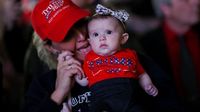On June 9, 2025, President Donald Trump unveiled a groundbreaking federal initiative at a White House roundtable aimed at reshaping the financial futures of American newborns. Dubbed "Trump accounts," this program proposes a one-time $1,000 government-funded investment account for every U.S. citizen born between January 1, 2025, and January 1, 2029. The accounts, which are part of the sweeping Republican "One Big Beautiful Bill," are designed to be tax-deferred and track the performance of a U.S. stock market index fund, offering a new way for families to build wealth from the very start of life.
The announcement took place in the State Dining Room of the White House, where President Trump was joined by a cadre of high-profile CEOs, including Michael Dell of Dell Technologies, David Solomon of Goldman Sachs, and Dara Khosrowshahi of Uber. These business leaders pledged billions of dollars in private contributions to supplement the government’s initial investment, signaling robust corporate support for the initiative. “These men and women lead large, successful companies. And they are committed to contributing millions of dollars to the Trump account. It’s really to be something incredible for children and their employees,” Trump said, highlighting the program’s potential impact.
Under the plan, the $1,000 seed money will be placed in a tax-deferred account managed by the child’s legal guardians, who can also add up to $5,000 annually in post-tax contributions. The funds will be locked in until the beneficiary turns 18, at which point they can withdraw up to 50% of the balance for qualified expenses such as education or home purchases. Full access to the account will be granted at age 30, allowing unrestricted use of the funds. This structure aims to encourage long-term savings while providing flexibility for important life milestones.
White House Press Secretary Karoline Leavitt described the program as a “pro-family initiative that will help millions of Americans harness the strength of our economy to lift up the next generation.” She emphasized that the “One Big Beautiful Bill” would not only create these investment accounts but also deliver the largest tax cuts in history and increase the child tax credit. House Speaker Mike Johnson echoed this sentiment during the event, calling the program “a bold, transformative policy that gives every eligible American child a financial head start from day one.”
Michael Dell, whose company will match the government’s $1,000 contribution dollar for dollar for children born to Dell employees, called the initiative “a simple yet powerful way to transform lives.” He noted that the program represents an investment in people, families, communities, and America’s future. Other CEOs in attendance, including those from Salesforce, Altimeter Capital, ARM Corp, ServiceNow, Robinhood, and Slack, also committed to supporting the accounts, highlighting a broad coalition of private-sector backing.
The idea behind Trump accounts taps into the power of compounding interest. For perspective, a $1,000 investment in the S&P 500 made 50 years ago would be worth nearly $350,000 today, according to Bespoke Investment Group. Even more recent investments show significant growth: a $1,000 investment 18 years ago would be worth $5,590, and one 31 years ago would be worth $22,770, factoring in reinvested dividends. Trump himself expressed optimism about the program’s potential, saying beneficiaries would “really be getting a big jump on life, especially if we get a little bit lucky with some of the numbers and the economies into the future.”
Despite the enthusiasm, the program faces notable challenges. The Trump accounts are part of a massive budget bill that narrowly passed the House and now confronts opposition in the Senate. Fiscal conservatives, including Senator Rand Paul of Kentucky, have voiced concerns about the bill’s projected $2.4 trillion addition to the national debt over the next decade. The Congressional Budget Office also reported that the bill could leave nearly 11 million more Americans without healthcare by 2034 due to cuts in Medicaid and food assistance programs.
Critics have also raised questions about the Trump accounts’ tax advantages compared to existing savings vehicles like 529 college savings plans and Roth IRAs. Unlike these, Trump accounts require post-tax contributions and withdrawals are subject to long-term capital gains or ordinary income taxes. Financial advisors suggest that while the government’s $1,000 seed money is a welcome boost, the accounts may not be the most attractive investment option for parents seeking to maximize tax benefits for their children’s future education or retirement.
The program’s predecessors offer instructive parallels. The United Kingdom operated a Child Trust Fund from 2002 to 2011, which provided government-funded savings accounts for children but was eventually discontinued. Singapore’s Baby Bonus Scheme includes government-matched savings accounts aimed at encouraging child-rearing and financial security. These examples provide a global context for the Trump accounts, highlighting both potential benefits and pitfalls.
House Speaker Mike Johnson underscored the urgency of passing the legislation, warning that failure to do so would result in “the largest tax increase in American history.” He urged lawmakers to move swiftly on what he called “pro-growth legislation” that would “help every single American.” The White House is pushing hard for Senate approval before the July 4 holiday, though the tight margins and internal GOP disagreements suggest the path forward remains uncertain.
President Trump’s initiative also carries political weight, as the program could serve as a tangible legacy and a rallying point for working-class voters ahead of the 2026 midterm elections. By branding the accounts with his name and securing commitments from influential corporations, Trump is positioning the program as a hallmark achievement of his second term.
As the Senate debates the bill, the nation watches closely. The Trump accounts represent an ambitious attempt to seed generational wealth and financial literacy from birth, but whether this vision will materialize depends on navigating complex fiscal and political hurdles. If successful, millions of American children could begin life with a financial foundation unlike any before, potentially altering the economic landscape for decades to come.






